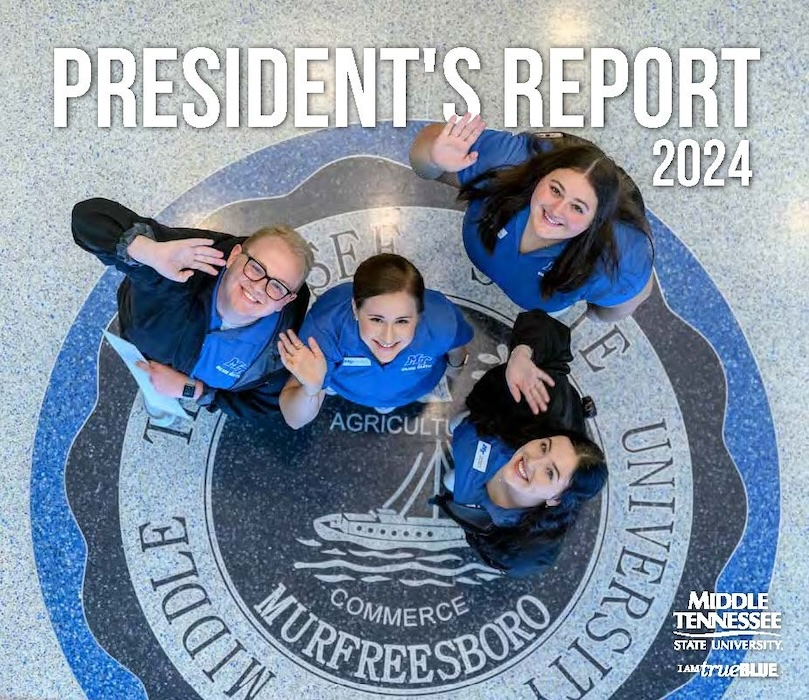Changing Times
| January 21, 2016
Filed Under: President's Post, Featured Articles
 As most of you are no doubt already aware, Gov. Bill Haslam has proposed sweeping change regarding the governance structure for the six Tennessee Board of Regents (TBR) universities, including MTSU.
As most of you are no doubt already aware, Gov. Bill Haslam has proposed sweeping change regarding the governance structure for the six Tennessee Board of Regents (TBR) universities, including MTSU.
The governor wants to remove those universities from under the direct control of the TBR, which has governed them for decades. In TBR’s place, new local governing boards would be fashioned that would have decision-making power over such crucial University operations as tuition rates, program enhancements, presidential appointments, and budget control.
According to Gov. Haslam, this proposed major structural change would be engineered, in part, to better allow the TBR to focus on the state’s community colleges and Colleges of Applied Technology, which have experienced dramatic enrollment increases as a result of the Tennessee Promise scholarship. The Tennessee Promise program offers eligible high school graduates two years of tuition-free community or technical college. (The Promise contributed to a 10-percent surge in first-time freshman enrollment statewide, a key development in Gov. Haslam’s Drive to 55 education initiative to raise the number of Tennesseans possessing postsecondary degrees or certification to 55 percent in order to meet future workforce demands.)
At the time of the writing of this report, there was still much unknown and undecided about the proposed new higher-education landscape that would be created under this new governance structure. The governor had appointed a task force to fine-tune his plan to create individual governing boards for the six affected Tennessee universities, and I was selected (along with the other presidents of universities currently governed by the TBR) to serve on that committee.
This proposed new governing structure, I believe, has great potential to enable MTSU to tackle its present and future challenges in an even more laser-focused manner. It could do so by granting the University both greater local autonomy in its decision making, as well as greater freedom to think entrepreneurially and even outside the box as regards the need for program enhancements and new initiatives. With the work MTSU has already been accomplishing over the past few years, specifically as it relates to attracting more college-ready students (including transfer students) to campus, I am confident that such a truly bold and potentially transformational proposal would lead to an even brighter future for our University. I look forward to learning and exploring the opportunities it could provide towards our mission of ensuring student success and providing even more graduates for the state’s workforce.
 In a related matter, John Morgan, chancellor of the Tennessee Board of Regents, announced his plan to retire at the end of January. David Gregory, who had planned to retire in January as TBR’s vice chancellor for administration and facilities development, was named acting chancellor and will serve until a permanent replacement is selected. Morgan, who has served as chancellor of the state’s university and community college system since October 2010 and led the system’s transformation to become more comprehensive and student focused, called the announcement bittersweet and said it was timed to acknowledge the accomplishments achieved by the system’s institutions over the past five years.
In a related matter, John Morgan, chancellor of the Tennessee Board of Regents, announced his plan to retire at the end of January. David Gregory, who had planned to retire in January as TBR’s vice chancellor for administration and facilities development, was named acting chancellor and will serve until a permanent replacement is selected. Morgan, who has served as chancellor of the state’s university and community college system since October 2010 and led the system’s transformation to become more comprehensive and student focused, called the announcement bittersweet and said it was timed to acknowledge the accomplishments achieved by the system’s institutions over the past five years.
Chancellor Morgan’s visionary leadership of the Tennessee Board of Regents helped bring about significant reforms and improvements in our state’s higher education system.
That leadership was demonstrated by his able work to guide TBR’s institutions during implementation of the Complete College Tennessee Act and Governor Haslam’s Drive to 55 initiatives.
As president of MTSU, I have respected and appreciated his counsel and guidance as we secured our $147 million Science Building, one of the top scientific teaching and research facilities in the nation, and put forward our Quest for Student Success, which has transformed how we teach and serve our students.
I have enjoyed working with the chancellor and, on behalf of our students, faculty, and staff, we thank him for his service to our state and system.



